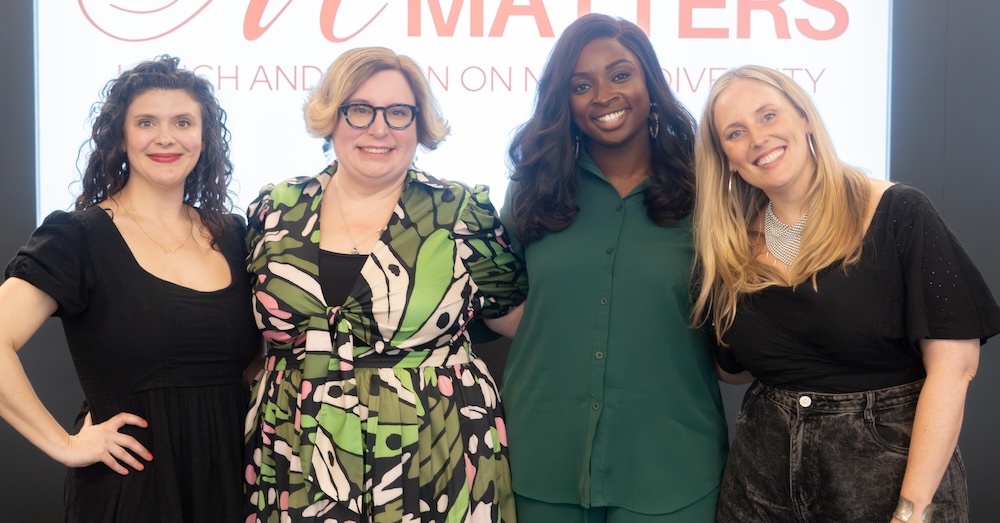Read
← Back to IdeasBuilding Work Environments to Empower Neurodiverse Employees

(L to R: Aubrie Therrien, Jennie Glazer, Tope Ajala, Camilla Scales)
To continue our focus on creating an inclusive culture for all, Ogilvy's Global DEI team recently hosted an insightful panel: "Mind Matters: Lunch and Learn on Neurodiversity". The event focused on elevating the lived experiences of those who identify as neurodivergent.
Moderated by Ogilvy's Global Head of DE&I, Tope Ajala, with a panel of experts that included Camilla Scales (Executive Director of Talent Operations at Ogilvy), Jennie Glazer (COO at Coqual), and Aubrie Therrien (Executive Director at Epic Players), employees from across our offices participated in a thoughtful conversation that explored the many experiences and challenges that our panel and neurodivergent colleagues face while navigating their work environments.
To kick off the event, we shared a video entitled: "Inside Ogilvy: Discussing Neurodiversity," a collaborative effort from 10 Ogilvy employees across the globe as they shared their experiences both as neurodivergent employees and as allies of the community. The video aimed to break down misconceptions and promote a better understanding of neurodiversity within the workplace.
After the video presentation, Glazer shared a striking statistic from a recent Coqual Summit, revealing that "75% of senior leaders do not disclose that they are neurodivergent out of fear of bias." Additionally, Glazer revealed that a partner company of Coqual's experienced a major drop in productivity from employees after mandating a return to office policy. When Coqual investigated the matter, they discovered that the lack of proper accommodation for neurodivergent employees was a significant contributing factor. This made evident the need for more inclusive and supportive work environments that offer accommodation in various forms for employees that are neurodivergent.
Therrien led a thought-provoking exercise that divided the audience into two groups. One group counted by ones, while the other counted by sevens. This exercise was meant to demonstrate the stark contrast in the ease of counting by 1’s against the challenge of counting by 7’s and quickly highlighted the experience that many neurodivergent individuals may face in critical thinking and problem-solving compared to their neurotypical counterparts.
Therrien emphasized the importance of creating an inclusive atmosphere, sharing that many members of leadership at EPIC Players are neurodivergent. She encouraged these individuals to disclose their neurodivergence, as it can foster a positive work environment and provide visibility for neurodivergent talent in leadership positions, breaking down misconceptions about their capabilities.
Therrien also highlighted the unique ways in which individuals at EPIC Players process information. To accommodate these differences and avoid overwhelming employees, the organization has introduced hand gestures that allow for communication without interrupting thought processes.
Additionally, they have a designated coordinator who focuses on understanding each individual's optimal methods for processing information and maximizing productivity. "To be clear is to be kind. No one wants 6-page emails. Give people the information they need," Therrien emphasized.
Scales advocated for small, easy, and relatively simple changes in industries to accommodate the needs of neurodivergent talent. These accommodations, such as providing noise-cancelling headphones or dark rooms, can significantly improve productivity for neurodivergent employees. Scales also noted that "Creative spaces thrive with brains of all different kinds." She emphasized the necessity for organizations to avoid forcing a single way of working on all employees, as this may not be the most effective approach for every colleague involved.
Glazer added, "What's good for someone who is neurodivergent is probably good for all of us," highlighting the universal benefits of inclusive practices.
Throughout the event, the panelists stressed the importance of intentionality in creating inclusive spaces. "We need to be more intentional with the things we do, neurodiverse or not," Scales remarked.
Ajala mentioned Ogilvy's progressive approach to this topic, which includes an "Inclusive Conversations" guide available to all Ogilvy employees. This document features several questions that allow managers to better understand specific working styles for their direct reports and help them better address their needs in the workplace.
Ajala concluded the event with a powerful message: "Inclusive spaces start with every single one of you." And emphasized that "Change has to come from those in the weeds daily," urging individuals at all levels to take responsibility for fostering inclusivity in their workplaces.
The event provided valuable insights and practical strategies for creating more inclusive and accommodating work environments. By embracing neurodiversity and implementing supportive practices, organizations can tap into a wealth of talents and perspectives, ultimately driving innovation and success.